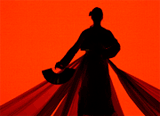Madama Butterfly: Black Box Opera

On September 18 I attended the Metropolitan Opera Guild's lecture with Peter Gelb and Anthony Minghella respectively the head of the MET and the Director of Madama Butterfly.
Anthony Minghella described the production as an empty stage, a black box set, nothing on stage at all, a more naked version, and a modest stage. Also, less movement from singers, and singers should only move when necessary. The use of a Japanese puppet will be Sorrow, the baby.
The Met's days of Franco Zeffirelli filling the stage with masses in new productions are over.
"I am fascinated at the exaggeration it seems to me of Zeffirelli's influence, only in the sense that some of those productions are stunning. It can't have been lost on everybody that I like to conduct Zeffirelli productions and Carlos Kleiber liked to conduct them," Levine said. "In an opera house that plays a broad spectrum of major operatic works, the diversity of style is very critical."
But Gelb counseled: "I believe there's a certain danger with working with directors who are overly familiar with the repertoire and continue to do the same opera over and over again."
Minghella, like Gelb, wants opera to have a populist bent. He applauds Gelb's decision to start a workshop that could lead to new operas from composers that include Adam Guettel, Jake Heggie, Wynton Marsalis and Rufus Wainwright, and a librettist group highlighted by Tony Kushner and John Guare. Among the singers Gelb hopes to bring to the Met are Audra McDonald and Kristin Chenoweth.
Elaine Padmore, director of opera at London's Royal Opera, applauds Gelb's moves.
"In general the perception was that the Met had a rather particularly conservative style, which many opera houses had now moved on from, and that if you had wanted to see something in a very traditional way, you would go to the Met to see that," she said. "Some people saw that as a very positive thing, of course. But for others it was, perhaps, a style that was not moving on with the times."
Clearly there has not been enough emphasis on the theatricality of the art form, which goes against what the Met previously had been," Gelb said. "When Rudolf Bing was the general manager, he was bringing Broadway directors here. When Jimmy Levine was the young music director, he had a partner in John Dexter, David Hockney was designing scenery. The Met was at the forefront of the opera world."
Gelb said all the changes are "an effort to galvanize the public and make the Met at the center of the performing arts world once again."
"At least in a very small way, this `Butterfly' is very important. Even though it represents a small part of the overall plan, if it's successful with the public — put aside the critics — that is proof that this is a plan that could work when rolled out over of the course of a season with numerous new productions of similar theatrical excitement and magnitude," he said.

0 Comments:
Post a Comment
<< Home